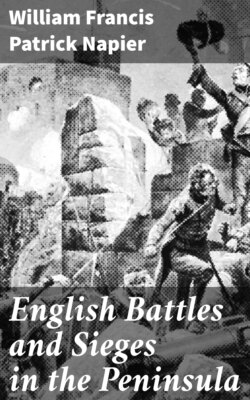Читать книгу English Battles and Sieges in the Peninsula - William Francis Patrick Napier - Страница 32
На сайте Литреса книга снята с продажи.
Combat of Campo Mayor. (May, 1811.)
ОглавлениеTable of Contents
It has been shown how Beresford was sent to oppose Soult beyond the Tagus, but the latter, disturbed by the battle of Barosa, which put all Andalusia in commotion, had returned to Seville, leaving Mortier to continue the operations. Campo Mayor surrendered the 21st of March, and four days after, Latour Maubourg, having to bring away the battering train and a convoy of provisions, issued from the gates with nine hundred cavalry, three battalions of infantry, some horse-artillery and sixteen heavy guns, all in column of march, just as Beresford emerged from an adjacent forest with twenty thousand infantry, two thousand cavalry and eighteen field-pieces. An astonishing apparition this was to the French, for so adroitly had Wellington, while seemingly absorbed in the pursuit of Massena, organized this army, that its existence was only made known by its presence.
All Beresford’s cavalry, supported by a field battery and a detachment of infantry under Colonel Colborne,19 were close up ere the enemy knew of their approach, and the horsemen, sweeping by their left round the town and moving along gentle slopes, gradually formed a crescent about the French, who were retreating along the road to Badajos. Colborne was then coming up at a run, a division was seen behind him, and the French infantry formed squares, supported by their cavalry, while their battering guns and baggage hurried on. General Long, holding back his heavy cavalry, directed some Portuguese squadrons, and the 18th Light Dragoons under Colonel Head, to charge. Head, galloping forward under a fire from the square, was met half-way by the French hussars with loose reins, and fiercely they came together, and many went down on both sides, yet those who kept the saddle drove clean through each other, re-formed, and again charged in the same fearful manner! Desperately all struggled for victory, but Head’s troopers riding close and on better chargers overthrew horse and man, and the hussars dispersed, yet still fighting in small bodies with the Portuguese, while the British squadron, passing under the fire of the square without flinching, rode forward, hewing down the gunners of the battering train and seeking to head the long line of convoy.
They thought the heavy dragoons, the infantry and the artillery, marching behind them, would suffice to dispose of the enemies they passed, but Beresford took a different view. He stopped a charge of the heavy dragoons; he suffered only two guns to open when six were at hand; he even silenced those two after a few rounds, and let the French recover their battering train, rally their hussars, and retreat in safety. Meanwhile the 13th and some of the Portuguese dragoons reached the bridge of Badajos and there captured more guns, but were repulsed by the fire of the fortress, and being followed by Mortier and met by Latour Maubourg’s retreating column lost some men, but passing by the flanks they escaped, to be publicly censured by Beresford! The admiration of the army consoled them. One hundred of the allies were killed, or hurt, and seventy taken; the French lost only three hundred and a howitzer, but the colonel of hussars, Chamorin, a distinguished officer, fell in single combat with a trooper of the 13th Dragoons, an Irishman of astonishing might, whose sword went through helmet and head with a single blow.
